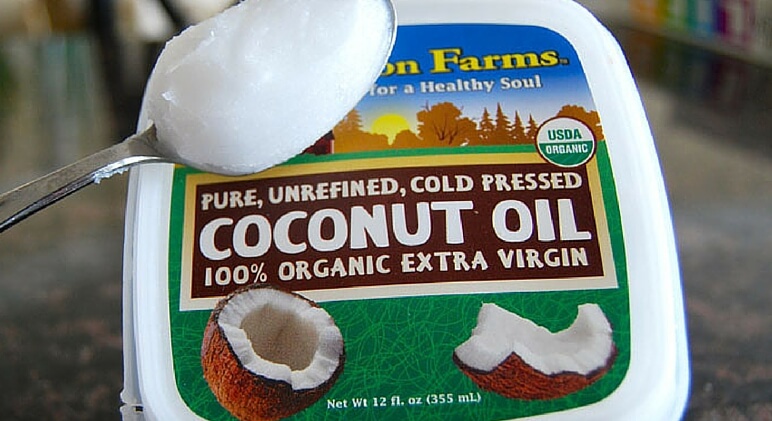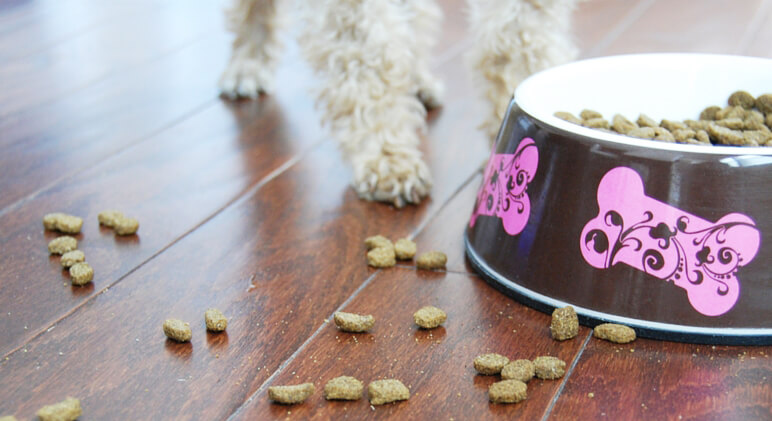I spend my days writing and managing social media accounts for several top health websites. Throughout my time working as a health blogger, I’ve learned a lot about coconut oil. It’s seriously nature’s medicine. But I don’t only write about the super oil, I also use it on a daily basis. Admittedly, I’m obsessed with coconut oil. I use it for everything from cooking to conditioning my hair and whitening my teeth. But I don’t stop there. I also feed it to my dogs and use it to moisturize their paws. Find out the top nine benefits of coconut oil for dogs below:
1) Healthy Digestion
Just one tablespoon of coconut oil contains 14 grams of fat, 12 grams of which are saturated fat. While doctors used to warn patients to stay away from this type of fat, today, we know not all sat fats are created equal. According to researchers, the saturated fats found in coconut oil are mostly beneficial lauric acid, which is a medium-chain fatty acid (MCFA). Studies show MCFAs put less strain on the pancreas than other fats and are easier for the body (both human and canine) to digest.
Coconut oil also has powerful anti-inflammatory benefits. If your pup suffers from any bowel issues, chances are their intestines are inflamed and damaged. So feed your pooch a little coconut oil every day to help soothe their insides.
2) Wards Off Bad Bacteria
Inside the digestive tract live bacteria – most good, some bad. In order for your pet’s body to function properly, researchers say their gut bacteria needs to stay in balance. In humans, a properly balanced gut has about 80 percent “good” bacteria to 20 percent “bad” bacteria. Well, it’s the same for your pet.
Unfortunately, poor diet, antibiotic use, routine deworming, parasite infections, and an overall unhealthy lifestyle kill your dog’s good gut bacteria (which is also referred to as probiotics). Luckily, coconut oil has anti-bacterial, anti-viral, and anti-fungal properties. So if bad bacteria begins to spread through your pup’s intestinal tract, coconut oil could help kill off the bad guys and nourish the good guys.
Some signs of unbalanced gut bacteria include:
- Poor digestion
- Weakened immune system
- Skin conditions
- Inflammation
- Illness
The best kind of coconut oil is organic extra-virgin, unrefined, and cold pressed. This is the brand that I use and absolutely love it:
3) Increase Nutrient Absorption
When a person or dog suffers from poor digestion, they don’t absorb all of the important nutrients in their food. By improving your dog’s digestion and gut bacteria, they are able to absorb more nutrients into their bloodstream.
4) Aids Weight Management
Over the years, there have been several studies conducted on the effect MCFAs have on weight loss and researchers say the results are promising. Coconut oil has been found to effectively boost metabolism, burn up calories, blast fat, and keep you feeling full for longer. Since nearly 60 percent of today’s pets are considered overweight or obese, coconut oil could be a life saver.
5) Improves Skin Health
Along with adding coconut oil to your pet’s diet, it can also be used topically. If your dog suffers from dry skin, bug bites, stings, burns, allergic reactions, or eczema then rub some coconut oil on his/her skin. As you can see, coconut oil has powerful healing benefits.
6) Moisturizes Paw Pads
A huge misconception that many people have is a dog’s paws can tolerate anything. That’s not true. Just like human feet, paws can crack, blister, and bleed. They’re not made of armor. According to the AKC, a dog’s paw is made up of skin, bone, tendons, ligaments, blood supply, and connective tissue. That doesn’t sound all that different than our anatomy. Rub some coconut oil on your dog’s feet every night before they go to bed to keep their paws soft.
Click here for other tips to keep your dog’s paws safe all year long.
7) Moistures Cracked Nose
If your dog is out in the sun a lot, you may begin to notice tiny cracks forming on the top of his/her nose. Rubbing a little coconut oil on the area can help heal and prevent this from happening!
8) Conditions Coat
As a woman who bleaches her hair, I can tell you how important it is to condition. But sometimes bottled conditioner just isn’t enough. That’s why I do a coconut oil hair mask twice a week. I rub coconut oil through my hair, let it sit for about 20 minutes, and then I wash my hair as normal. I can’t even tell you how soft and shiny my hair is after a coconut oil hair mask. Just how coconut oil keeps my locks healthy, it can keep your pet’s coat looking sleek and shiny.
9) Improves Doggy Breath and Oral Health
Since coconut oil has anti-bacterial, anti-fungal, and anti-viral properties, it kills any harmful substances in the mouth. This benefits oral health in a few different ways:
- Improves bad breath
- Whitens teeth
- Prevents plaque
- Heals gums
How Much Coconut Oil Should I Feed My Dog?
As a general rule of thumb – feed your dog a 1/2 teaspoon of coconut oil for every 10 pounds of body weight. You can either add coconut oil to your dog’s food or let them lick it right off a spoon!











